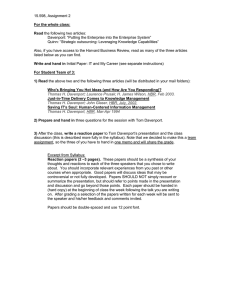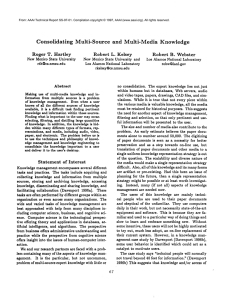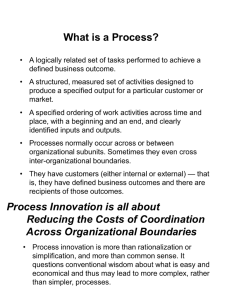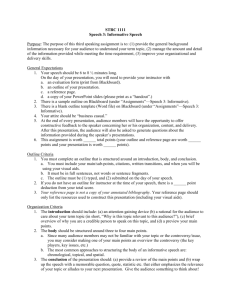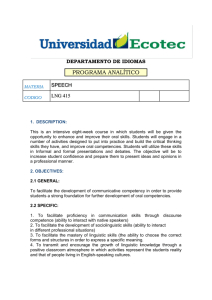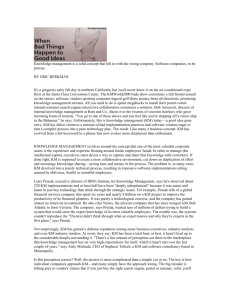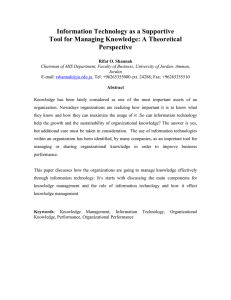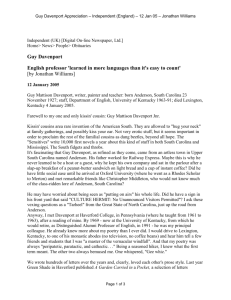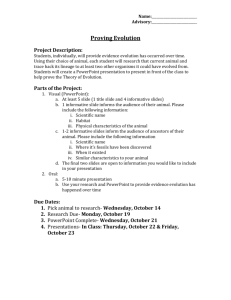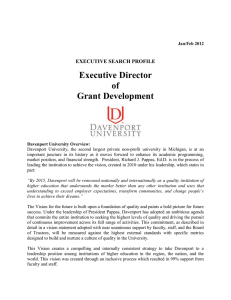Student Responsibilities
advertisement
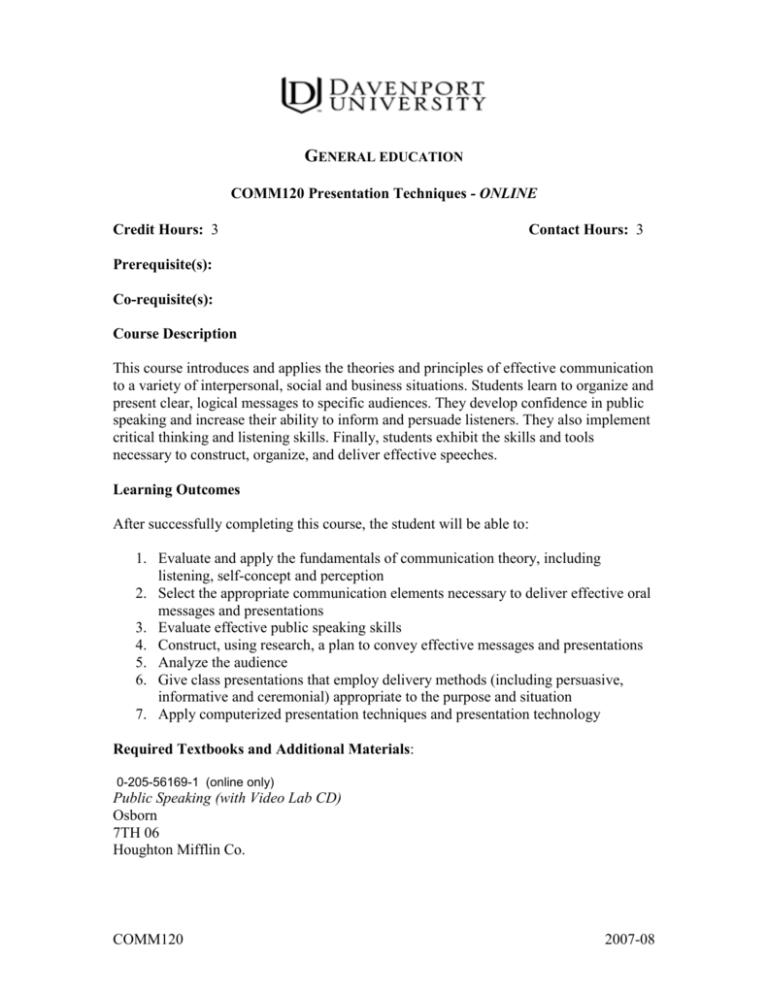
GENERAL EDUCATION COMM120 Presentation Techniques - ONLINE Credit Hours: 3 Contact Hours: 3 Prerequisite(s): Co-requisite(s): Course Description This course introduces and applies the theories and principles of effective communication to a variety of interpersonal, social and business situations. Students learn to organize and present clear, logical messages to specific audiences. They develop confidence in public speaking and increase their ability to inform and persuade listeners. They also implement critical thinking and listening skills. Finally, students exhibit the skills and tools necessary to construct, organize, and deliver effective speeches. Learning Outcomes After successfully completing this course, the student will be able to: 1. Evaluate and apply the fundamentals of communication theory, including listening, self-concept and perception 2. Select the appropriate communication elements necessary to deliver effective oral messages and presentations 3. Evaluate effective public speaking skills 4. Construct, using research, a plan to convey effective messages and presentations 5. Analyze the audience 6. Give class presentations that employ delivery methods (including persuasive, informative and ceremonial) appropriate to the purpose and situation 7. Apply computerized presentation techniques and presentation technology Required Textbooks and Additional Materials: 0-205-56169-1 (online only) Public Speaking (with Video Lab CD) Osborn 7TH 06 Houghton Mifflin Co. COMM120 2007-08 Alternative Delivery Statement Alternative delivery formats require considerably more student time outside of class and maintain the same level of assignments and academic rigor as the traditional classroom format. Davenport University Excellence System (DUES) Davenport University believes that those students who successfully complete any certificate, associate, bachelor, or master’s program at the University should be able to demonstrate certain professional and academic abilities. These abilities embody both the key practical and theoretical skills taught and measured throughout all Davenport University academic programs and, in accordance with the mission of the University, prepare students for success in their chosen profession. Dynamic Leadership o Leadership o Reasoning and Problem Solving o Teamwork Universal Communication o Interpersonal Communication o Oral Communication o Written Communication o Global Perspective Professional Excellence o Honesty and Integrity o Computer Proficiency o Mathematical Literacy o Career Skills o Information Literacy Writing and Communication across the Curriculum: All Davenport classes expect students to develop as communicators. It is to be expected that assignments within this course will reinforce methods, techniques, concepts and practices associated with either written or oral communication or both. Davenport recognizes the essential need of communication skills in all of its students. Quantitative Analysis across the Curriculum: All Davenport classes expect students to develop as critical thinkers. It is to be expected that assignments within this course will reinforce the methods, techniques, concepts, and practices associated with quantitative reasoning: reading and interpreting tables and graphs, data analysis in decision making, estimation, modeling, problem solving, and logical thinking. Davenport recognizes the essential need for the Quantitative Literacy of all of its students. COMM120 2007-08 Assessment of Student Learning Assessment measures will be based on the learning outcomes, the DUES, and the Writing and Communication across the Curriculum and the Quantitative Analysis across the Curriculum initiatives. ADA Statement: Students with disabilities may request accommodations as provided within federal law. In order for the University to adequately review each case, requests should be made to the Disability Services Coordinator prior to the start of the semester. Requests made after the start of the semester should be completed as early in the semester as possible to prevent delays in accommodation. Students may contact their advisor or go to the Davenport University website for the name of the Disability Services Coordinator for the location where they attend. Student Responsibilities Students are bound by all policies of Davenport University and should familiarize themselves with these through reading the catalog and student handbook. All students must complete the final assessment for the course, such as the final exam, project, or presentation. Students who do not complete the final assessment will receive a grade of F. Students are expected to be adequately prepared for each class session. It is reasonable to expect at least two hours of outside study for every hour spent in the classroom. Students are expected to assist in maintaining a classroom environment that is conducive to learning. Therefore, free discussion, inquiry, and expression are encouraged. Behavior that interferes with the instructor’s ability to conduct the class or the ability of students to benefit from that instruction is not acceptable. University Academic Integrity Statement Davenport University recognizes the principles of honesty and truth as fundamental to ethical business dealings and to a community of instructors and students. The University expects students to respect these principles. As a point of academic integrity, students are required to submit original material of their own creation. Plagiarism of any material and cheating are serious offenses and, if established with sufficient evidence, can result in failure of the course or dismissal from the university. Plagiarism refers to the use of someone else’s ideas or words without correct documentation. It is the student’s responsibility to ask the faculty member to clarify any questions on correct use of documentation for the work submitted in the course. Cheating refers to the use of someone else’s knowledge or sharing course work in a way that is unauthorized by the faculty member. The faculty member may authorize the use of COMM120 2007-08 reference books for a paper, for example, but require that a test be done without such help. Should a student be penalized and wish to contest the allegation, the academic integrity due process procedure will be followed. The University utilizes Turnitin.com plagiarism detection software. All papers will be submitted to Turnitin.com where they will be compared against the entire Internet and against a database of previously submitted student papers. Scheduled Class Meeting Times The state dictates minimal contact hour requirements that are rigidly upheld by the University. Some of that instructional time is used for tests. The University's expectation is that classes will meet for the entire assigned time. Standardized Grade Scale The following grading scale is a University standard for courses in this area of study: A 100 – 93 A92 – 90 B+ 89 – 87 B 86 – 83 B82 – 80 C+ C CD+ D F 79 – 77 76 – 73 72 – 70 69 – 67 66 – 63 62 – 0 REQUIRED ASSESSMENT: COMM 120 PERSUASIVE or INFORMATIVE PRESENTATION (L.O. 1, 2, 3, 4, 5, 6, 7) The Persuasive or Informative Presentation represents 20% of the student’s course grade, and should bring together the skills covered throughout the course. Students need to apply the fundamentals of communication theory in order to communicate their message effectively to their audience. Students will analyze their audience in order to select appropriate techniques, both verbal and nonverbal, to reach and engage their listeners. Finally, students will need to display their proficiency with PowerPoint. Note that this presentation also requires an annotated bibliography that should be submitted for instructor’s comments and approval prior to the presentation. This should be a professional oral presentation. It serves to demonstrate all that the student has learned. Students may tape their presentations at faculty discretion using a video camera. Requirements: -Topic approved by instructor in advance COMM120 2007-08 -Annotated bibliography approved by instructor in advance; annotated bibliography must be documented according to the Manual of the American Psychological Association (APA style) -Key word outline to be used during presentation; turned in after presentation -Detailed formal outline to be turned in after the presentation -Appropriate PowerPoint visual aid; slides printed; turned in after presentation -Videotaped of the persuasive presentation at the discretion of the instructor Annotated bibliography, key word outline, detailed formal outline, PowerPoint slides, and videotape (if possible) must be included in the artifact packet when submitted to the campus coordinator. Artifacts are due no later than the last day that grades may be posted for the semester in which the artifacts were submitted.. EVALUATION The Informative or Persuasive Presentation should be evaluated on both form and content. The presentation is worth 20% of a student’s course grade. Students should be evaluated on the effectiveness of the presentation’s organization and logic, on the use of verbal and nonverbal language, on the effectiveness of the speech’s elements, and on their use of PowerPoint. A Presentations rubric, a sample evaluation form, and a sample topic approval form can be found with Writing and Communicating Across the Curriculum (WCAC) materials, available on the Davenportal/Academics/Tools/Old Faculty Resources. COMM120 2007-08
